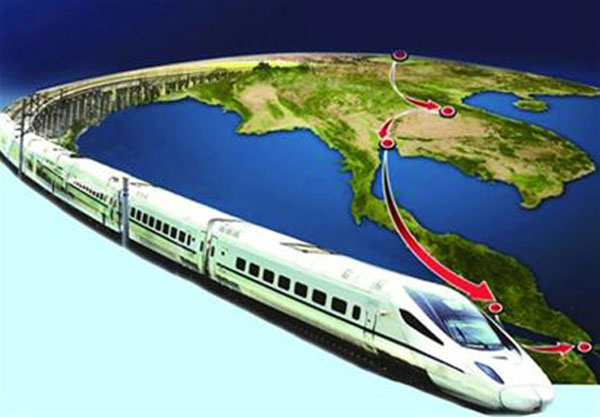China-Thailand railway to begin construction in early 2017
 0 Comment(s)
0 Comment(s) Print
Print E-mail Xinhua, December 18, 2016
E-mail Xinhua, December 18, 2016
 |
|
The planned China-Thailand railway linking the Thai-Lao border with Bangkok will benefit Thailand. [Photo/Xinhua] |
The planned China-Thailand railway linking the Thai-Lao border with Bangkok will benefit Thailand as the high-speed railway is expected to improve local people's livelihood, the Thai transport minister said.
"We don't have a high-speed railway here in Thailand yet, but we foresee that high-speed railways can bring change to the life of Thais, as (what has been) proved in China," Transport Minister Arkhom Termpittayapaisith said in an interview with Xinhua.
He believed that once the traveling time from Bangkok to cities along the railway is cut to one or two hours, these cities with railway stations may have a great chance to attract more people and investment becasue of the high living costs in Bangkok.
"The economic benefit is much higher than financial return," he said, adding that he learned from China that high-speed railways did help cities to attraction more population and investment.
Arkhom also mentioned that the 873-km railway can help bring more Chinese tourists to the kingdom and thus benefit its tourism.
"The traveling time from the northeastern Nong Khai province on the Thai-Lao border to Thai capital Bangkok will be shorter and it may attract Chinese tourists who like to travel by train," he said.
Around 8 million Chinese tourists visited Thailand in 2015 and the number for Chinese tourists this year is expected to exceed 9 million. China is now the largest source of visitors to Thailand, accounting for about 30 percent of all international tourists.
Lao people may also find the railway a convenient means of transport for them, as one-seventh of the landlocked country's 7 million population visited Thailand yearly.
Once the China-Thailand railway gets connected with the China-Laos railway, it would take around 4 hours to travel from the Lao capital of Vientiane to Bangkok, Arkhom said, adding that train tickets between the two capitals would become more competitive compared with airfares.
The minister said the railway is also to benefit China as it can thus be connected with Southeast Asia, where Chinese goods and commodities can be transported to Thai ports through Thai railways.
In the meantime, he pointed out that the China-Thailand railway with a maximum speed of 250 km per hour will be only for passenger transportation while cargos will be handled on the existing meter-gauge railways.
The Thai government decided to divide the project into two phases and build a 256-km railway from Bangkok to Nakhon Ratchasima first. The remaining part will link Nakhon Ratchasima with Nong Khai.
According to Arkhom, the construction of an initial 3.5 km section will start soon after a bidding in early 2017, which will be followed by other sections of the first phase. The design work of the second phase, Nakhon Ratchasima to Nong Khai will also begin early next year.
He said the first phase may finish in 3 years and the whole project may take 5 years and the railway will also be extended to the Malaysian capital of Kuala Lumpur and finally Singapore.
Regional connectivity, which the Belt and Road Initiative emphasizes, will finally benefit the whole region, Arkhom said.
During the interview, Arkhom denied that China ever asked for development rights to land alongside the China-Thailand railway, as there were reports by local media alleging China wanted to be involved in the commercial development of these land.
"I think it is clear since we started the cooperation, commercial development and business will be part of Thailand," said Arkhom.
He said that either the State Railway of Thailand (SRT) will consider commercial development inside and outside of the stations and on both sides of the railway or the state-owned rail operator can give the rights to development to private sectors through a public-private partnership.
In that case, he explained, a Chinese company can join hands with a Thai firm to be a part of the land development.
Arkhom praised Chinese companies for their advanced technology, saying they can team up with local companies to participate in infrastructure projects.
According to the minister, Thailand has rolled out infrastructure programs with 65 billion U.S. dollars in the next 8 years. Some 10 metro lines will be built in Bangkok and its adjacent provinces.
He said Chinese companies can bid for these planned metro lines but they have to team up with a local company to join the biding, according to Thai laws and regulations.
"Some Chinese companies are already doing this way as we can find a Chinese company in the construction of Bangkok's blue line extension," Arkhom said. A Chinese firm is also joining hands with Thai companies in the planned high-speed railway between Bangkok to Rayong.






Go to Forum >>0 Comment(s)